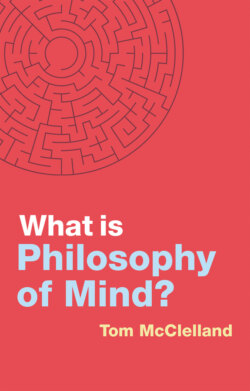Читать книгу What is Philosophy of Mind? - Tom McClelland - Страница 14
1.5 A Plan of Action
ОглавлениеOver the next five chapters, we’ll be looking at the key positions in philosophy of mind – the main ‘theories of the mental’. These theories are defined by the answers they offer to the Three Big Questions, so by the time we’re finished you’ll have a decent grip on how to approach those questions. We’ll be looking at the main theories of the mental in historical order, running from Descartes’ work in the seventeenth century right up to contemporary debates in the field. One advantage of this is that it allows us to see how each new theory relies on its predecessors, building on their successes and attempting to overcome their failures. Another advantage is that it allows us to see how philosophy of mind interacts with the science of its time, drawing on scientific insights and challenging scientific assumptions. Furthermore, it allows us to see how philosophers living in different centuries can nevertheless be cut from the same cloth, adopting similar approaches to the puzzles of the mind. The following is an overview of our journey:
Chapter 2 explores Descartes’ dualism. The seventeenth century saw great progress in our scientific understanding of the material world. Descartes, a scientist in his own right, asked how the mind would fit into this emerging picture. He argued that the mind must be an immaterial substance that stands apart from the material world but that is able to interact with it via the body. But Descartes’ arguments faced a flurry of objections that still haunt dualists today.
Chapter 3 jumps ahead to the early to mid-twentieth century and introduces two materialist theories of mind. Behaviourism argues that mental states are nothing more than patterns of behaviour, and identity theory argues that mental states are nothing more than brain states. These theories were inspired by the emerging sciences of brain and behaviour and promised to overcome the failings of dualism. But each theory faced problems of its own.
Chapter 4 takes us to the mid- to late twentieth century and the computer revolution. According to functionalism, the mind is akin to a computer with our brain acting as the hardware on which the software of the mind runs. We look at how functionalism improved on other materialist theories to become the leading theory of the mental.
Chapter 5 looks at a problem for materialism that gained special traction at the end of the twentieth century – the Problem of Consciousness. A range of striking thought-experiments suggest that theories like functionalism cannot explain what our mental lives feel like on the inside. Conscious experience is thus an explanatory residue that requires special treatment. I look at two radical ways of dealing with this explanatory residue: a partial reversion to dualism on the one hand and a flat denial that conscious experience exists on the other.
Chapter 6 offers a brief overview of the contemporary scene in philosophy of mind. We will explore how recent work has enhanced our understanding of the Three Big Questions and how philosophy of mind has become integrated with the cognitive sciences. I’ll also take a look at how philosophy of mind might develop in the future.
In one sense, the overview of philosophy of mind that I will offer won’t be especially opinionated. I’ll be presenting mainstream views and keeping some of my more eccentric opinions to myself. But in another sense the overview I offer will inevitably be opinionated. The philosophy of mind is a big field, so my selection of which ideas to discuss in this short book reflects my opinions on what’s most important in the discipline. One way to get the benefit of some different perspectives is to engage with the suggested readings at the end of each chapter, which are arranged in recommended reading order.
